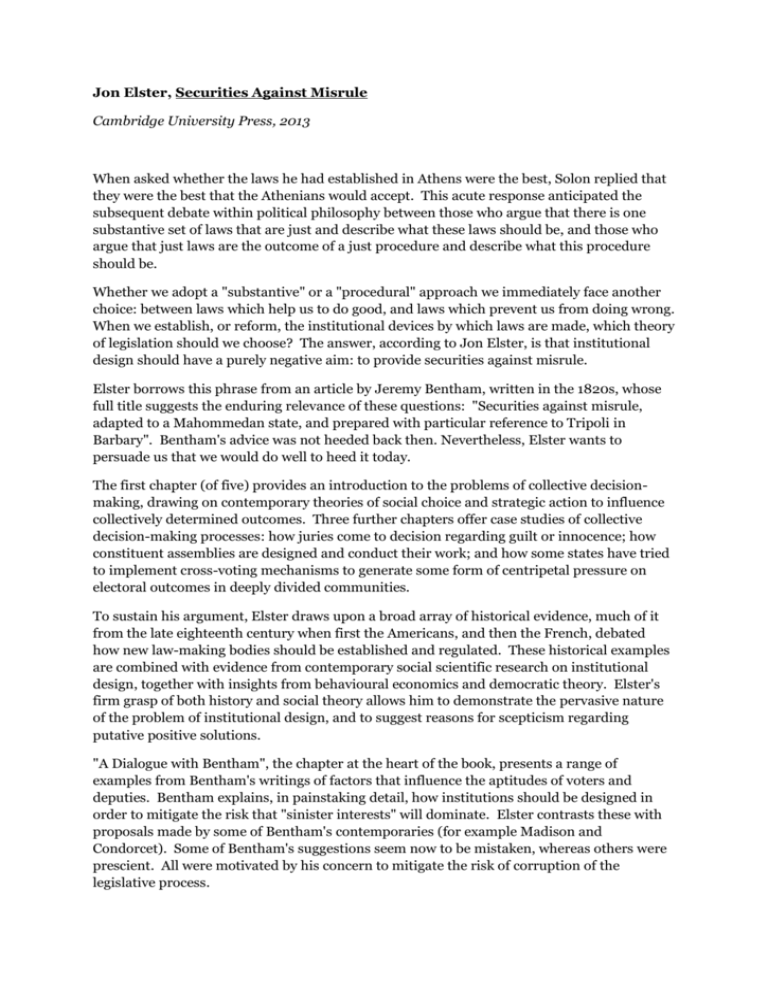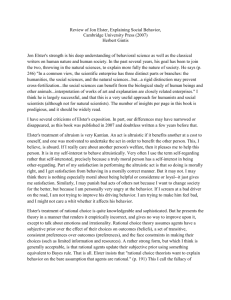Bentham was right
advertisement

Jon Elster, Securities Against Misrule Cambridge University Press, 2013 When asked whether the laws he had established in Athens were the best, Solon replied that they were the best that the Athenians would accept. This acute response anticipated the subsequent debate within political philosophy between those who argue that there is one substantive set of laws that are just and describe what these laws should be, and those who argue that just laws are the outcome of a just procedure and describe what this procedure should be. Whether we adopt a "substantive" or a "procedural" approach we immediately face another choice: between laws which help us to do good, and laws which prevent us from doing wrong. When we establish, or reform, the institutional devices by which laws are made, which theory of legislation should we choose? The answer, according to Jon Elster, is that institutional design should have a purely negative aim: to provide securities against misrule. Elster borrows this phrase from an article by Jeremy Bentham, written in the 1820s, whose full title suggests the enduring relevance of these questions: "Securities against misrule, adapted to a Mahommedan state, and prepared with particular reference to Tripoli in Barbary". Bentham's advice was not heeded back then. Nevertheless, Elster wants to persuade us that we would do well to heed it today. The first chapter (of five) provides an introduction to the problems of collective decisionmaking, drawing on contemporary theories of social choice and strategic action to influence collectively determined outcomes. Three further chapters offer case studies of collective decision-making processes: how juries come to decision regarding guilt or innocence; how constituent assemblies are designed and conduct their work; and how some states have tried to implement cross-voting mechanisms to generate some form of centripetal pressure on electoral outcomes in deeply divided communities. To sustain his argument, Elster draws upon a broad array of historical evidence, much of it from the late eighteenth century when first the Americans, and then the French, debated how new law-making bodies should be established and regulated. These historical examples are combined with evidence from contemporary social scientific research on institutional design, together with insights from behavioural economics and democratic theory. Elster's firm grasp of both history and social theory allows him to demonstrate the pervasive nature of the problem of institutional design, and to suggest reasons for scepticism regarding putative positive solutions. "A Dialogue with Bentham", the chapter at the heart of the book, presents a range of examples from Bentham's writings of factors that influence the aptitudes of voters and deputies. Bentham explains, in painstaking detail, how institutions should be designed in order to mitigate the risk that "sinister interests" will dominate. Elster contrasts these with proposals made by some of Bentham's contemporaries (for example Madison and Condorcet). Some of Bentham's suggestions seem now to be mistaken, whereas others were prescient. All were motivated by his concern to mitigate the risk of corruption of the legislative process. Elster's conviction is that Bentham was broadly right in his claim that the best that could be achieved through institutional design was to restrict as far as possible the influence of opportunism and personal interest. Elster's own negative strategy also aims to reduce those factors - passion, prejudice and bias - that always have a distorting influence on decisionmaking, however the instrument of decision-making is designed. He thinks the political philosopher's goal is to design a system of law-making in which both the people and their representatives are, as far as is possible, impotent to do harm. As Elster notes: "It is hard to imagine a view further removed from ideas of republican virtue". Problems of rational action and social explanation have been recurrent themes in Elster's work over the past thirty years. His other books have often drawn on the history of social theory, notably his comprehensive critique of Marx's methodology, Making Sense of Marx (1985). Elster concluded that book with the claim that it was no longer possible to hold to be true and important any of the views that Marx himself held to be true and important. Despite this, he also noted that many of the views and values he holds to be true and important can be traced back to Marx. This remark echoes John Stuart Mill's assessment of Bentham, written 150 years earlier: "It was not his opinions, in short, but his method, that constituted the novelty and the value of what he did; a value beyond price, even though we should reject the whole, as we unquestionably must a large part, of the opinions themselves". Jon Elster's achievement, in this well-written and engaging book, is to show the lasting value of Bentham's negative approach to institutional design, and to provide grounds for doubting that normative political philosophy could offer us anything better when we embark upon the making of laws.











